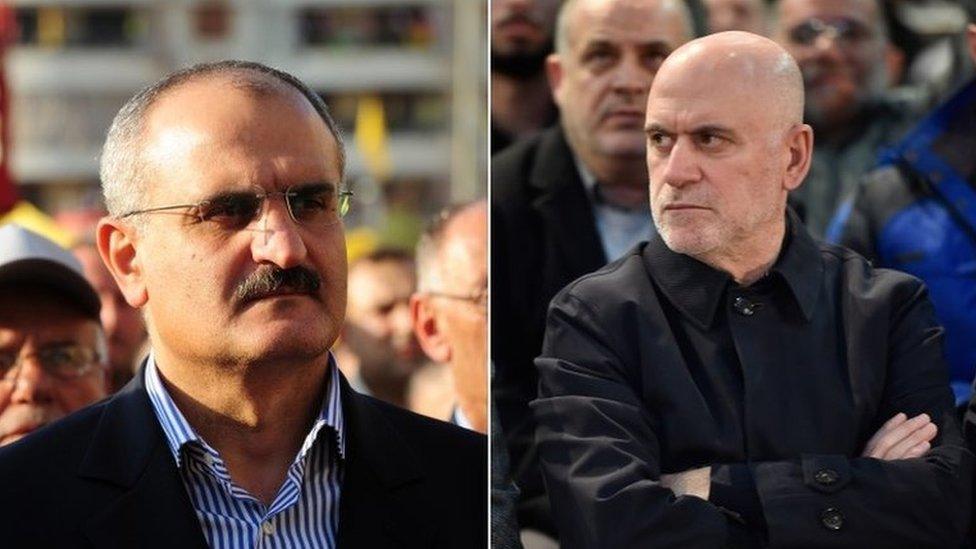Lebanon crisis: US puts sanctions on former ministers allied to Hezbollah
- Published

The US said Ali Khalil (L) and Youssef Finyanus (R) directed favours to Hezbollah
The US has put sanctions on two former Lebanese government ministers for allegedly providing material support to Hezbollah and engaging in corruption.
Yusuf Finyanus and Ali Khalil were accused of ensuring contracts went to firms owned by Hezbollah, which the US considers a terrorist group, and moving money to associated institutions.
There was no response from the two men.
The move comes amid a Lebanese backlash against government corruption following the devastating explosion in Beirut.
Almost 200 people were killed and 6,000 others were injured when 2,750 tonnes of ammonium nitrate stored unsafely at the city's port blew up on 4 August.
Beirut blast: 'I love you, don’t leave me'
Lebanon was already reeling from an economic crisis that had caused its currency to collapse, driven up unemployment, and plunged many into poverty.
The government resigned in the wake of the Beirut blast and Western powers are demanding that its replacement implement reforms to unlock financial aid.

More on the explosion in Beirut

"For too long, Lebanon's political leaders have ignored their responsibility to address the needs of their people and instead built a political system that serves their private interests," US Secretary of State Mike Pompeo said in a statement, external.
"The United States supports the Lebanese people's call for reform, and we will use all available authorities to promote accountability for Lebanese leaders who have failed their people," he added.
He alleged that the two former ministers had "directed political and economic favours to Hezbollah, including ensuring Hezbollah-owned companies won government contracts worth millions of dollars and moving money from government ministries to Hezbollah-associated institutions".
The emotional impact of the city's deadly port explosion has been felt as far away as Ethiopia and Syria
Mr Finyanus is a member of the Christian Marada party, an ally of Hezbollah. He was minister of transportation and public works from 2016 until the start of this year.
Mr Khalil is a senior official in the Shia Muslim Amal movement, which is also allied to Hezbollah. He served as minister of public health from 2011 to 2014 and minister of finance from 2014 to this year.
There was no immediate response from the two men to the US move. However, the leader of Marada and a member of parliament from Amal both dismissed the sanctions as "political".
The US stopped short of sanctioning any current government ministers or some of the prominent Lebanese officials who have been denounced in the volatile aftermath of the Beirut explosion, including central bank governor Riad Salama.
But a senior state department official, David Schenker, said that "everyone should absolutely expect" more actions in the coming weeks or months.